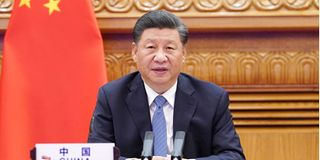Developing countries offer China weapon against Western criticism

Chinese President Xi Jinping.
Developing countries including those in Africa could be China’s biggest weapon against the Western criticism of rights violations by Beijing, offering President Xi Jinping a smooth sail to continue implementing his policies.
With this, China’s determination to shield itself from criticism of its policies Tibet, East Xinjiang, Southern Mongolia, Manchuria and Hong Kong, and even Taiwan could continue on the same trajectory as in the last decade.
According to the 20th National Congress of the Communist Party of China, which decided to re-appoint President Xi as the Party’s General Secretary a fortinight ago, China will continue its socialist policies, purging those opposed to a uniform plan for the country.
That will include rigorous rejection of outside forces intent on weakening this system.
“China stands firmly against all forms of hegemonism and power politics, the Cold War mentality, interference in other countries’ internal affairs, and double standards,” said the report of the Congress tabled by President Xi.
“We have intensified efforts to advance socialist rule of law in our country, and a comprehensive framework for law-based governance has taken shape.”
Except this is not agreeable to everyone.
Last week, the US led a group of 50 countries to condemn China’s treatment of the people in its autonomous regions.
“We are gravely concerned about the human rights situation in the People’s Republic of China, especially the ongoing human rights violations of Uyghurs and other predominantly Muslim minorities in Xinjiang.
“We believe that addressing human rights violations, engaging in meaningful dialogue, and working together as partners are foundational to creating more inclusive societies where all can fully enjoy their human rights,” the joint statement said at the UN General Assembly Third Committee on the Human Rights Situation in Xinjiang on October 31.
Among the 50 were mainly Western countries such as the US, Canada, Denmark, Norway, UK and Switzerland.
Three African countries Eswatini, Liberia and Somalia also supported this call, claiming there had been evidence of “large-scale” arbitrary detention and systematic use of invasive surveillance on the basis of religion and ethnicity; severe and undue restrictions to legitimate cultural and religious practices, identity and expression, including reports of destruction of mosques, shrines and cemeteries; torture, ill-treatment and sexual and gender-based violence, including forced abortion and sterilisation; enforced disappearances and family separations; and forced labour.
The Chinese counter-lobbied the criticism, gaining a joint statement from 60 countries led by Cuba, saying the matters of Xinjiang, Tibet and Hongkong are squarely China’s internal issues.
Among the supporters of this call were Zimbabwe, Sudan, South Sudan, Equatorial Guinea and Egypt. Cuba and Zimbabwe have been especially critical of the West because they are under US sanctions which they argue have crippled their economies.
But these countries are also critical to China’s own ambitions, especially for the Belt and Road Initiative, which President Xi launched in 2015.
In Beijing, officials said the 60’s joint statement, plus several others who refused to take sides shows China is right to pursue its international politics that calls for non-interference.
“The world has long been clear-eyed about and tired of the farcical shows of few Western countries’ politicisation of human rights and double standards,” said Zhao Lijian, the Spokesperson of the Chinse Foreign Ministry at a press conference on Thursday, calling it “a patchwork of disinformation.”
“People know what the truth and facts are. The community of nations, especially the developing countries, are against the politicisation of human rights issues. The attempt of few Western countries to use issues like Xinjiang to smear, suppress and contain China will not succeed.
President Xi’s administration had imposed a strict counter-terrorism policy after a series of terror attacks. But those counterterrorism policies have since been criticised.An assessment by the UN Office of the High Commissioner for Human Rights (OHCHR) on the situation in Xinjiang raised concerns on abuses, but which China rejected.
Xi is seen as the most powerful leader in China since Mao Zedong, the founder of modern china and who ruled over the Communist Party of China unchallenged for 27 years (1949-1976). Xi has promised to ‘modernise’ the country’s army and encourage tech advancement, something that got Washington admitting China would be its biggest challenge.
But China’s rise could also mean no dissent and a clampdown on voices in Hongkong, Tibet and Xinjiang, according to an analysis by the Singapore Post this week.
Besides Xinjiang, China has fought off claims of discrimination in Tibet including lack of employment and a ‘ban’ on local languages, according to a report of the International Campaign for Tibet.





